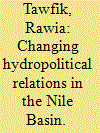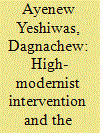| Srl | Item |
| 1 |
ID:
147933


|
|
|
|
|
| Summary/Abstract |
A new hydro-political order is emerging in the Nile Basin. Upstream riparian states have improved their bargaining power vis-à-vis downstream countries by adopting a common position in the negotiations over a new framework agreement to govern the utilisation of the Nile waters. Some upstream riparians have unilaterally constructed hydraulic projects that threaten Egypt’s hegemonic position in the basin, the most notable of which is the Grand Ethiopian Renaissance Dam (GERD). Whether these developments will lead to a more equitable utilisation of water resources and a more cooperative order will depend on the policies of the riparian states, especially in the Eastern Nile. Respect of the Declaration of Principles on the GERD signed between Egypt, Ethiopia and Sudan could help build trust between the three countries after years of tensions around the project. Beyond that, a basin-wide plan for the utilisation of water resources would not only maximise the benefits from the river and address the common challenges facing the basin, but also reduce the political costs of tensions on future projects.
|
|
|
|
|
|
|
|
|
|
|
|
|
|
|
|
| 2 |
ID:
192665


|
|
|
|
|
| Summary/Abstract |
This study explores the interface of the Grand Ethiopian Renaissance Dam (GERD), a high-modernist hydraulic scheme, with the protracted frontier conflict in Metekel Zone of Benishangul Gumuz Regional State. Without downplaying the national technocratic ambitions that it invokes, based on fieldwork conducted in 2022, the study witnessed as the dam’s presence in Metekel has escalated the perennial state-local skirmishes, rekindled inter-group hostilities, and ultimately trans-nationalized the frontier mayhem in the area. Such impacts of the dam were rooted in the state’s long-held frontier imagination and coercive relocation program through which hegemonic high-modernist narratives contested locals’ lived experiences. Differential local impacts of the dam, its role in mounting competing territorialities, and the concomitance of the trans-national feud with local discords were also equally influencing. However, the interface between the GERD and frontier struggles in Metekel was broadly shaped by the frontier’s history and national governance policies. In revealing so, the study provides insights that complement debates about frontier dynamics and struggles in Ethiopia and Africa, which tend to concentrate on tensions related to land transfer for private investors. Indeed, frontier struggles seem too complex: one must interrogate multiple actors, the complex history, and a broader range of issues with local, national, and regional dimensions.
|
|
|
|
|
|
|
|
|
|
|
|
|
|
|
|